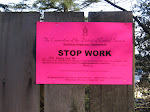The banana republics of B.C. politics
Citizens are left on their own to guard against electoral irregularities in municipal elections
By Daphne Bramham, Vancouver Sun, March 21, 2009
Even the provincial minister responsible for municipal legislation did not believe that citizens would have to spend their own money to overturn an unfair election but he learned he was misinformed.
The B.C. Liberal government has gone far beyond convention in silencing opposition during the May election campaign with its gag law on third-party advertising. Yet the same Liberal government allows a virtual free-for-all during municipal elections.
Civic elections are "the Wild West," says Simon Fraser University political scientist Patrick Smith, who has concluded that more than four times as much money per voter is spent than in provincial or federal elections.
Yet, it's left up to citizens to enforce the electoral rules. There is no independent oversight, which gives municipal elections in British Columbia some of the hallmarks of voting in banana republics.
The Liberals did amend the Local Government Act a few months before the November civic elections. For the first time, groups and individuals supporting candidates or slates of candidates were required to register. But the legislation has no enforcement mechanism. No one is responsible for policing it. If citizens believe there are electoral irregularities, they have to spend their own money to ensure that unfair elections are overturned and transgressors either lose their seats or are banned from participating in the next election.
It's a serious oversight that renders the legislation so lame that even former community development minister Blair Lekstrom couldn't believe it.
In an interview the day before the Nov. 15 provincewide elections, Lekstrom assured me that his department had it wrong. Lekstrom, a former mayor, said it couldn't possibly be that it would be left up to citizens to police and prosecute any election irregularities. He said that is the role of the police.
Over in West Vancouver, Kash Heed, who recently resigned as chief constable, agreed. Police are continuing their investigation into complaints of election irregularities including the failure of at least one lobby group -- Low Taxes, Low Growth Association -- to register as a campaign organizer even though it spent thousands of dollars attempting to get a slate of candidates elected. It also didn't file a financial disclosure by the March 16 deadline.
However, mayoral candidate Vivian Vaughan noted on her financial disclosure form that the association donated $1,000 to her campaign.
Another group, Preserve West Vancouver, filed a financial disclosure claiming to have raised $3,550. Vaughan is listed as having contributed $1,200 to it and two council candidates -- Carolanne Reynolds and Danielle Charlton -- donated $500 and $300 respectively.
But Preserve West Vancouver's listed expenditures do not include a $3,200 donation to Charlton that she lists on her financial disclosure.
Apparently, Lekstrom -- who has since moved on to become the energy minister -- was set straight by his staff after the elections were over. In an e-mail to David Wilson, a Central Saanich resident who alleges irregularities in that municipality's election, Lekstrom said Wilson should take his concerns to court.
But there may be no better illustration of the ramifications of this electoral regulatory gap than Central Saanich. The local co-op was heavily involved in endorsing and stumping for council candidates, who would look favourably on a rezoning needed for its new store.
During the election, Peninsula Co-op sent out letters to all of the candidates asking if they would support a rezoning of four residential lots to allow construction of a 27,000-square-foot grocery store adjacent to its gas centre. It told the candidates that their responses would be distributed to its membership.
Without seeking the permission of its membership, the co-op sent out letters to some, if not all, of its 28,000 members urging them to vote for the candidates who would support the rezoning. It had posters printed and prominently displayed in its grocery store listing the candidates who supported and those who opposed it.
Formal investigation sought
Peninsula Co-op registered as campaign organizer on Nov. 6, only nine days before the election, even though its campaign began weeks earlier and even though Central Saanich chief electoral officer Sara Ribeiro says that groups and individuals must register as soon as they have spent $500.
The Co-op spent a total of $16,488 endorsing and stumping for council candidates.
David Wilson, the resident whom Lekstrom corresponded with, recently wrote to Attorney-General Wally Oppal and Solicitor-General John van Dongen, asking for an formal investigation into the co-op to determine whether it acted improperly both under the Local Government Act, the B.C. Co-operatives Act and the Freedom of Information and Protection of Privacy Act by spending more than $500 and using the co-op's membership list to try to influence the election's outcome -- all without ever having sought the approval of the members.
"Normally, I would officially file this complaint with the local police department in Central Saanich," Wilson wrote. "But unfortunately, Chief Constable Paul Hames is a member of the Peninsula Co-operative's board . . . . How can the chief constable investigate a local organization's action, when he is part of that organization's executive board? If I ask Chief Hames to investigate, there is a potential for a conflict of interest."
Hames is on the co-op's finance, membership and community relations committees. Cathie Ounstad, one of the members of the police board, is also on the co-op board.
Wilson goes on to say that he's concerned about his safety and that of his family, having raised his concerns with the mayor, the municipality's chief electoral officer, the co-op's general manager and the police chief. Other concerned citizens, he alleges, have been threatened with lawsuits.
He then goes on to state what seems to be obvious: "If the law has been broken, it needs to be investigated by unbiased law enforcement officials and our democratic rights as citizens should be protected without threat of persecution."
The concerns don't end with Central Saanich and West Vancouver where the police investigation is continuing.
Not a single campaign organizer or elector organization registered in Summerland. Yet, there were at least 15, quarter- and half-page ads that ran in the Summerland Review. Similar ads also ran in the Penticton Herald and the Western News.
"Some concerned residents and business owners of Summerland urge you to please get involved and support candidates who are not against some growth in this town . . . . Please get out and support those whose politics will not result in anti-business, anti-family and anti-Summerland by way of their anti-growth, one perspective politics!" says one ad, which gives no indication of who the concerned residents or business owners are or who paid for the ad.
Citizens for Smart Governance ran ads in support of mayoral candidate Janice Perrino. Only two days before the election, there was a full-page ad for Perrino that was paid for "by a generous donation" as well as two quarter-page ads opposing smart growth that had no indication of who had paid for them.
There was also a quarter-page ad endorsing the Perrino slate that included the names of 90 supporters, including a number of realtors and developers.
Some of those supporters' names were also among a longer list of names on a pamphlet endorsing the Perrino slate. The entire slate was elected.
A full-page ad in the Review is $856.52 plus GST; a half-page is $459.62 and a quarter-page is $225.12 plus GST.
So, even in smaller municipalities, it doesn't take long to run up a $500 tab. And $500 is the threshold amount. Any person or group spending $500 or more is legally required to register with the chief electoral officer as either a campaign organizer or an elector organization and file financial statements within four months of the election.
But no one is responsible or legally required to check up on them. Except citizens. And, as Wilson noted, in small communities standing up and complaining can be an uncomfortable, lonely and even frightening proposition.
'Mistakes were made'
Brian Sadler is one of those citizens. Sadler and another unsuccessful candidate for Gibsons' town council, along with two other residents did go to B.C. Supreme Court after last November's municipal election, asking for the election to be declared invalid.
They alleged all kinds of irregularities in the vote-counting -- the most serious of which was that 327 votes suddenly appeared two days after the election during a recount that was done without scrutineers and without the knowledge of any of the candidates.
Even though Justice Bruce Cohen disagreed with the complainants, he did note in his written judgment, "It is far from clear who opened the ballot boxes" when the deputy chief electoral officer did a "review" of the ballots two days after the election.
He even wrote, "Certainly mistakes were made in tabulating and calculating the election results. However . . . there is no evidence of bad faith, only inadvertence and the errors made were discovered and corrected before the official election results were declared."
Cohen concluded that rather than asking for the election to be declared invalid, the complainants should have asked for a judicial recount.
But Sadler contends that a judicial recount wouldn't have solved the mystery of where those extra 327 votes came from. It wouldn't change the fact that there was no voters' list and volunteers at polling stations weren't even given electoral maps to determine whether voters' addresses fell within the municipal boundaries.
The court case cost close to $20,000 and, for the citizens' trouble, Sadler says they have been "bad-mouthed around town."
They considered an appeal. Not only was the cost prohibitive, Sadler says it would have paralyzed the town council for most of this year and as a taxpayer and resident he didn't want to do that.
Still, the case did result in some positives. In exchange for Sadler and the others dropping their appeal, the town agreed not to sue them for costs. Plus, the council unanimously agreed at its March 3 meeting to do a complete electoral process review.
It's a step. But as Sadler says, it's up to the provincial government to fill the vacuum that exists because of no formal monitoring of the due process required in elections.
"This is crap. We have a banana republic going on right here," Sadler says. He knows a thing or two about that. He spent five years in Bosnia as a political officer for the United Nations and election oversight was included in his duties.
dbramham@vancouversun.com
© Copyright (c) The Vancouver Sun
Sunday, March 22, 2009
Subscribe to:
Post Comments (Atom)




















No comments:
Post a Comment